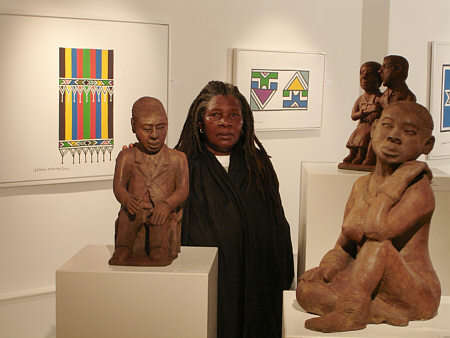Venda-born Noria Mabasa’s latest artwork is a sculpture of a woman who is bending down. Her face reflects stress, disappointment, and a fear of facing the world – due to a lack of education.
It is one of the pieces the 80-year-old artist keeps in her gallery at Tshino village, just outside Thohoyandou in Limpopo.

Mabasa’s work centres on access to education and gender-based violence.
The sculpture of the distressed woman, which is just shy of a metre in length, was completed around the time former president Jacob Zuma announced free higher education for those who qualified.
Mabasa, a world-renowned sculpture artist, uses dead wood and clay in her art, which raise awareness about social issues.
According to SA History Online, she began to make clay sculptures of Domba figures in the early 1970s after long financial hardship.
Education, youth issues
About a decade later, after meeting Venda sculptor Nelson Makhuba, she was encouraged to venture into wood carving, a skill which led her to become the first black woman, and the only Venda woman in South Africa, who became a famous wood carver, the site states.
News24 visited the artist at her gallery to find out about her passion for creating artwork inspired by social challenges over the past 40 years or so. Top of her mind was the issue of access to education for the youth.
Mabasa believes the world will not change for the better unless the government focuses on education and makes sure it is freely available for the majority of needy youth.
She wants the government to show its commitment to deal with social challenges and to ensure that access to education is accompanied by job creation and further opportunities.
Parents suffer, she said. They take their children to school and make sacrifices in the hope that – in the end – jobs will be created.
“If nothing happens, our children will die suffering, like their grandparents. We sacrifice, but we are not seeing the changes.”
“Some youths are lazy and addicted to alcohol and drug abuse. That is also killing our country,” she said.
Works showcased
Mabasa’s series of work has been showcased in Britain, Canada and other countries.
Her current masterpieces in the gallery portray gender-based violence and how elders in rural areas managed conflicts and domestic violence decades ago.
Often, in cases of domestic violence, it was the woman’s responsibility to make the best interests of her children her concern.
“This is the picture of a woman who, after some differences with her husband, embarks on a lonely journey with food over her head for her child,” she said as she pointed at one of her sculptures.
If a couple separated as a result of violence, the woman’s parents would send a delegation to the man’s family to find out why their daughter has returned to them, she explained.
“These days, people are killing each other and killing children as well. It is very disturbing. We are living in a society that needs leadership.”
Like many artists, Mabasa also has her own story to tell. It involves individuals who claimed to be middlemen, acting on her behalf. Since that experience, she is weary of showcasing her work in public, she said.
“I believe that artwork should not be hidden, but the manner in which we have been robbed, it keeps one worried that it’s better to keep one’s work on the shelves,” she added.

